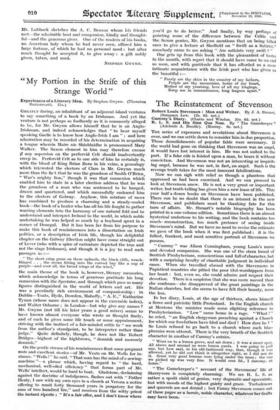The Reinstatement of Stevenson Robert Louis Stevenson : Man and
Writer. By J. A. Steuart. (Sampson Low. 12s. 6d. net.) '
Gummy 's Diary. (Chatto and Windus. 31s. 6d. net.) THE series of exposures and revelations about Stevenson is over, and we can settle down to consider him in due proportion. Those demolishments of popular fable were necessary. If the world had gone on thinking that Stevenson was an angel, it would have lost interest in him. He was not suited to the part. If a false role is foisted upon a man, he bears it without conviction. And Stevenson was not an interesting or inspirit- ing angel, became he was not, in fact, an angel. Such is the revenge truth takes for the most innocent falsifications.
Now we can sigh with relief as though a phantom that oppressed us had been exorcized. And we can proceed to look at Stevenson anew. He is not a very great or important writer, but truth-telling has given him a new lease of life. This year half a dozen books on Stevenson have been published. There can be no doubt that there is an interest in the new Stevenson, and publishers must be thanking fate for this turn of affairs. Mr. Steuart's notable biography has been printed in a one-volume edition. Sometimes there is an almost hysterical undertone to his writing, and the book contains too much- reconstruction, too much pretence of seeing inside Stevenson's mind. But we have no need to revise the estimate we gave of the book when it was first published : it is the
fullest, frankest, and most sensitive portrait of Stevenson we possess.
" Ctumny " was Alison Cunningham, young Louis's nurse and devoted companion. She was one of the stern breed of Scottish Presbyterians, conscientious and full of character, but With a surprising faculty of charitable judgment in individual cases. When she travelled abroad with the Stevensons in Papistical countries she pitied the poor idol-worshippers from her heart : but, even so, she could admire and respect their devotion; There is a suspicion that she was more moved than she confesses—she disapproved of the great paintings in the
Italian churches, but she seems to have felt their beauty, none the less.
In her diary, Louis, at the age of thirteen, shows himself a fierce and patriotic little Protestant. In the English church at Mentone the minister made some slighting reference to Presbyterianism. " Lew " came home in a rage. " Mat ! " he cried, " an English clergyman preaching against a Church for which our forefathers have bled and died ! How dare he ? " So Louis refused to go back to a church where such blas- phemies were uttered. There is the very breath of the Scottish character in another of Cununy's entries.
" Went on to a lemon grove, and sat down ; it was a sweet spot. All above and around us were lemon yards. I was going to pull one, but Lew said, in his old-fashioned way, that, though it was allowed, yet he did not think it altogether right, so. I did not do it. Some very good lemons were lying under the trees ; the one we picked up was very fine. It would cost 2d., I daresay, at home."
" The Gamekeeper's " account of the Stevensons' life at Skerryvore is completely charming. We see R. L. S. as rather a spoilt child of genius, very dogmatic and egocentric, but with moods of the highest gaiety and grace. Turbulences and quarrels are not denied ; but Fanny Stevenson comes out of these pages as-a heroic, noble character, whatever her faults may have been. - - - -






























































 Previous page
Previous page